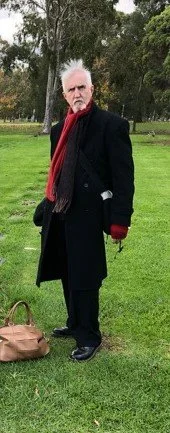…is a book of poems… written immediately upon awakening, in the manner of a “book of dreams”.
fragments of colliding memories - both real and envisioned; a surreal juxtaposition of childhood revisited, or as a young adult in Melbourne, to the decades later pervasive reflections from the hills overlooking Wagga… the writing dwells on nostalgia, loss and disappearance… different mirrors of place, of then and now, and of a determinedly rural, eclectic experience of inland NSW.
NEILL OVERTON
Neill Overton was a Senior Lecturer in Art History at Charles Sturt University in Wagga Wagga, before he disappeared without trace, and ended up playing cards in the swamplands with Colonel Kurtz.
“There is both nostalgia and nightmare in the (yes, Drysdalesque) landscapes - more a sense of entrapment than of escape. Dense but centrifugal ... Very painterly in its images and references. Sketches a sensibility as well as recalling photographs and actual experiences.”
- David Gilbey, author of Death and the Motorway.
NEILL OVERTON
HIDDEN IN THE CRAWL SPACE
The poems that comprise Hidden in the Crawl Space are in part historically anchored to Melbourne in the 1950s - 70s, and move to regional Wagga Wagga and narratives from the 1850s onwards. These include speculative fictions of returned soldiers after World War One sifting through the parklands of Collins Park in Wagga Wagga in search of a lost brooch, and recollected visions of Melbourne streets that John Brack painted from the 1950s; all surgical suppliers and scissors in windows.
Reimaged country town life since the 1930s looms large across these writings; darkling stains, dredged up in dreams. Sourced from written and oral histories of the Riverina, each poem is a fragment of colliding memories - both real and envisioned; a surreal juxtaposition of childhood revisited, or of a young adult in Melbourne, and decades later to the pervasive reflections of aging and loss as seen from the hills overlooking Wagga, through fraught times since 2013 of floods and bushfire.
The town and the city exert their different holds on the characters, faces and places manifesting in Hidden in the Crawl Space. The smalltown-isms and grip of place; Wiradjuri land with its colonialist histories… against the nostalgic echo of suburban Glen Iris streets in Melbourne.
Page 38
sleeping-vision of the clown-scape, and the water-wheel perpetual motion machine flowing to a sea at once as familiar as the FX Holden, yet disappeared into that same time-concept of the all-night drive-in theatre positioning its white speaker stands robotically on the asphalt, dissolved by flight. The fantastic was never uncovered in invention of ghouls, or glass- handed Matisse church interiors, but for Correggio resides in the evocation of the readily familiar -
poised like serpentine porcelain at the edge of the sea, almost forgotten by the modern world, still ethereally beyond its dictates of logic. In aCCOR-Dance with Surrealist Law 703/84B, the striking of keys needs to create new signals marrying accident to deliberation.
White dot (in Brighton)
Good grief, Charlie Brown Skyships over the everglades Smash-faced Mr Zonk came to the door in his underwear Off-white long johns and no time for the Watchtower Landing lights in the cornfields Leave your temper and your shoes outside in the mud on the mat, and good grief, Charlie Brown you stacked a roof-high woodpile of my faults out the back carried in a few green branches every night or two left them curled waiting by the hearth in a half-light John Mills in that 1950 sunken submarine in Morning Departure He sure knew how to get the job done in cramped quarters He seemed like an ordinary man.
Staring out at the burnt circles in the cornfield where the horses were still sleeping Standing in long johns at the flywire farmhouse door Staring out past the cactus plants on the verandah’s edge Into the black whirring paddock, good grief, Charlie Brown What were you waiting for? A miracle on Baylis Street, A rocket-sled to Ming’s red planet Mongo?
Killed in a crematorium, but it was only a ruse Waking fused to a chair in the hospital corridor, there is something heroic in waiting and patience not a history book page devoted to hospital all-nighters of nurses staying light-hearted in the face of nothing but whinging about the cold, the blankets, the bed-pans, the monitor beeps good grief, Charlie Brown, that John Mills sure got the job done before dawn.
From the guard tower of the remand centre
Snowballs roll down prison walls, near where the pine forests burnt down in a muddy brown sky, torn as wrapping paper, dark as an eclipse bobcat undertaker pushing charred trees underground, craning over his shoulder. From the guard tower he’s just a tiny moving yellow bee on the snowbank.
Most kids here have spent the last eleven of their eighteen years incarcerated in one place or another with different names Jimmy had never been out for more than eighteen months straight, Even the colonel predicted he would be slain fighting over household objects, a stolen toaster, a jumper, or just loud voices in a driveway Unravelling whispers, the scraping of a handbag on a bonnet A desk-lamp inside the house clicks on like a rifle shot A baker delivering morning bread from a carthorse dray I submerged our loaf in the bath Did you think I would fall so easily Colonel, your invasion of modern devices is complete, but the members of the underground are many ice and brandivino are a nasty mix, turns them mean to the ambos and wired for a fight, from this guard tower they file past the razorwire to a basketball court, and to thinking it’s harder on the outside than in.






